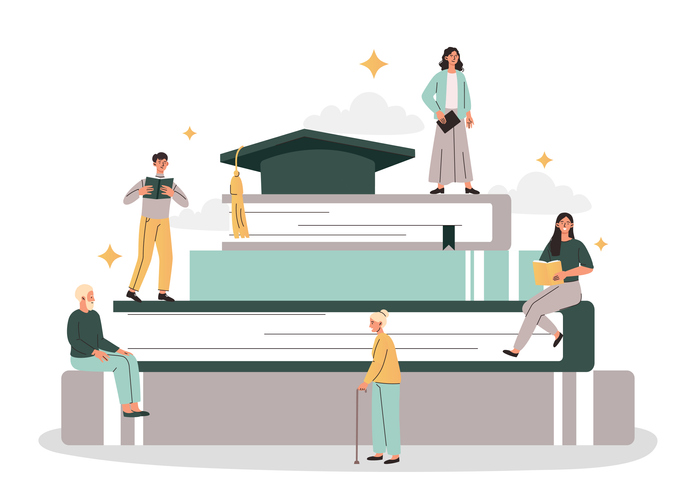We want to learn, but we want to do it the fastest and most efficiently, whether to reinforce university studies, stay updated, aspire to a better job, or acquire new life skills. Whatever our purpose, the MOOC (Massive Open Online Courses) educational model is an excellent option. These are high-quality content online courses with free or low-cost access. They are called “massive” due to the large number of students enrolled and “open” because of no prerequisites for enrollment and training and the option of obtaining a certificate. Recent technological trends, such as Artificial Intelligence (AI), are triggering renewed momentum in the innovation and transformation of educational models as we know them, including MOOCs, affecting their impact on individual learning and training throughout life.
Lifelong Learning (LLL) integrates two concepts: learning and life. The combination implies that learning extends throughout the different phases of a person’s life and development, not only in formal education and training environments but also in various learning spaces through many forms and media. Therefore, learning should not be reduced to a few years of formal education. Lifelong learning comprises five main elements: 1) education for all age groups, 2) all levels of education, 3) all learning modalities (formal, non-formal, and informal), 4) all learning spaces and spheres, 5) and a variety of purposes (UNESCO Institute for Lifelong Learning, 2022).
That said, the contribution of MOOC courses in LLL is evident by offering access to quality education to anyone who wishes it at all educational levels, granting freedom, flexibility, and independence to the student, who decides what, when, where, and how much to learn. Through MOOC courses, we can explore content in different areas of interest, update ourselves, or deepen a specific area of knowledge to acquire new skills or abilities. MOOC participants develop various skills in self-learning, self-management, time management, technology management, and distance communication.
MOOC platforms and the advancement of Artificial Intelligence
The change coming due to integrating AI programs into MOOC courses reminds us of the science fiction film The Matrix (1999), written and directed by Larry and Lilly Wachowski, where the protagonists learn any skill, such as martial arts or piloting a helicopter, simply by connecting to “the Matrix” to upload the chosen content directly to the brain. Within minutes, they achieved their learning goal. We do not intend to emulate The Matrix. Still, the truth is that innovating pedagogical and digital models is imperative to leveraging the new tools at our disposal to construct a new educational reality.
This year, MOOC platforms are expected to integrate AI technology into their offerings to assist content authors in designing their courses and customize education by answering questions and monitoring users’ performance as if the AI were a personal tutor.
Coursera, one of the leading platforms offering MOOC courses, will integrate two artificial intelligence tools this year to revolutionize its model: Coursera Author, aimed at designers and authors of the content, and Coursera Coach, for the course enrollees.
Coursera Author will offer the pedagogical designer or content author the possibility of creating the course structure, suggesting readings, generating activities, and creating question-and-answer banks for course evaluations. Coursera Coach aims to cover one of the controversial aspects of this model, which is the possibility of giving personalized feedback to users as if it were a tutor. Coursera Coach will be able to answer specific questions about the content and cite the readings or videos in the course to clarify concepts reviewed (Edscoop Staff, 2023).
On the other hand, the Khan Academy virtual learning platform will integrate an intelligent tutoring assistant called Khanmigo based on GPT-4; it is still in the pilot phase. However, this intelligent assistant could save teachers time to focus on the students who need their attention and direction the most because its AI engines tell the teacher which students understand a concept and which need extra help. Additionally, students can ask all the questions they need (new or repeated) if a concept is unclear; the intelligent assistant will patiently generate human-like answers. (Ward, 2023).
With the above, advances in the development of AI will also allow moving towards more personalized learning for students since teachers can design classes with instruction oriented towards the needs of each student, allowing them to learn at their own pace. AI will also improve adaptive learning, which uses machine learning algorithms that adjust the students’ activities or lessons in real-time based on their current performance. These guide each student’s learning path and suggest the content to achieve the expected learning (Apple Magazine, 2023).
It will be fascinating to see throughout this year how the transformation of educational models through the integration of AI into LLM (Large Language Models) or large language models in MOOC, chatbots, and other emerging trends applied in education like personalized and adaptive learning will help us improve teacher training for future professionals.
Tecnologico de Monterrey’s MOOC strategy
Concerning Tec de Monterrey’s MOOC strategy through its Institute for the Future of Education (IFE), we have observed in the last seven years that the MOOC student has a learning need and wants to satisfy it “now” to apply the acquired learning as soon as possible. Given that we live in an age of immediacy with constant changes full of uncertainty, we need to acquire knowledge and skills quickly, effectively, and flexibly.
At Tec de Monterrey, the MOOC model reaches hundreds of thousands of users from different countries. The Top 10 are Mexico, Colombia, Spain, Peru, the United States, Argentina, Chile, Ecuador, Brazil, and Guatemala, but we have also detected users in many European and Asian countries. Who are the students enrolling in the MOOC educational offerings of Tec de Monterrey on Coursera, and what are they looking for? Below, I share the profile of our students.
Tec de Monterrey students taking MOOC courses on Coursera
- 46.90% – Full-time professionals
- 21.27% – Unemployed people looking for a job
- 7.98% – Part-time employees
- 7.00% – Full-time self-employed
- 6.47% – Unemployed people not looking for work (Full-time students)
- 6.16% – Part-time self-employed
- 4.22% – Other
The ages of our students on Coursera range from 18 to over 65 (Data from Tec de Monterrey on Coursera platform, 2023).
As teachers, we can enhance our students’ learning by referring them to MOOC courses since registration is open, learning is punctual, and the courses cover the content in a short period (approximately four weeks). On the other hand, users seeking knowledge can explore the educational offerings of MOOC courses and build their training paths, considering and evaluating their learning goals. They can consider obtaining a digital certificate, which can be part of their knowledge profile verifiable by any person or institution, anytime, anywhere. The possibilities for teachers transmitting knowledge or MOOC students acquiring it are enormous.
The strategic value of MOOCs for Higher Education Institutions (HEIs)
MOOC courses have become a competitive differentiator within HEIs in the search to add value to higher education. Undoubtedly, HEIs contribute to social growth through Massive and Open Education, which impacts the most significant number of people globally, entailing rewards and benefits for educational institutions.
The six main benefits of HEIs offering MOOC courses are:
- International positioning of the HEI (branding).
- The attraction of new students to regular or continuing education programs.
- Dissemination of professors-authors who are experts in their areas of knowledge.
- Option for flexible academic leveling courses.
- Support for classes currently being taken.
- Inclusion of the alternative credentialing strategy.
HEIs must not assess MOOC courses only based on the terminal efficiency number since the applied learning transcends a grade or obtaining a certificate. In this sense, the maxim can be invoked, “Everything that can be counted does not necessarily count; everything that counts cannot necessarily be counted.” The dashboard metrics of these platforms only show some of the beneficiaries of this model because many users enrolled in a MOOC acquire the desired learning and apply it immediately without necessarily finishing the course. It indicates breaking an educational paradigm and reveals a significant learning value that HEIs can leverage.
Reflection
The current educational transformation has occurred for many reasons that are not only technological. Online learning has been a trend in education since before the 2020 pandemic, with more than a decade since the creation of the first MOOC. However, during the COVID-19 health crisis, educational institutions discovered the potential of reaching students anywhere in the world from wherever they are. Likewise, students also had the experience of online or remote education with its advantages and disadvantages. However, they discovered something significant, which was another way to move forward with their current and future academic training.
Constant technological changes and recent advances in AI are generating substantial changes in our personal and professional lives, affecting how we communicate, interact, and learn. The frequent updating of our skills and competencies is a continuous need met through lifelong learning. Online education technology platforms such as Coursera, edX, Udemy, and Khan Academy, among others, are designed to provide a lifelong learning approach that looks set to prevail (Marr, 2023). Hence, the strategy of Tec de Monterrey in Coursera to support student training corresponds to this remarkable trend in the innovation of higher education.
Finally, from a perspective of democratizing quality education with access through LLL, MOOC courses can help people discover and learn their passions for personal or professional fulfillment. HEIs and the public must embrace the change of mentality as the gateway to implementing and accepting the new pedagogical models.
“I try to free your mind, Neo.
But I can only show you the door.
You are the one who must go through it.” – Larry and Lilly Wachowski (1999)
About the author
José Luis Mata Fernández (jlmata@tec.mx) has 22 years of experience in Educational Innovation and eLearning. He has participated in consulting programs and given online conferences for various LATAM universities. He currently collaborates in Alternative Credentials at the Institute for the Future of Education at Tecnologico de Monterrey. His areas of interest include screenwriting, storytelling, and eLearning.
References
AppleMagazine. (2023). How Technology is Changing Education. AppleMagazine. https://applemagazine.com/how-technology-is-changing-education/56966
Atchoarena, D. (2022). Making lifelong learning a reality: A handbook. UNESCO Institute for Lifelong Learning. https://www.voced.edu.au/content/ngv%3A95011
Edscoop Staff (2023, abril 19). Coursera to introduce AI-powered online learning coach. EdScoop. https://edscoop.com/coursera-ai-powered-online-learning-coach/
Marr, B. (2023, 17 febrero). The Top 5 Education Trends In 2023. Forbes. https://www.forbes.com/sites/bernardmarr/2023/02/17/the-top-5-education-trends-in-2023/?sh=259c5d604d39
Shah, D. (2021, 3 diciembre). By The Numbers: MOOCs in 2021 – Class Central. The Report by Class Central. Accessed May 18, 2022, at https://www.classcentral.com/report/mooc-stats-2021/
Tec de Monterrey (2023). Datos del Tec de Monterrey en Dashboard de la plataforma COURSERA, 2023.
UNESCO Institute for Lifelong Learning (UIL). (2022). Making lifelong learning a reality: a handbook. UNESCO Institute for Lifelong Learning, Hamburg, Germany. https://www.voced.edu.au/content/ngv%3A95011
Ward, M. (2023). More edtech companies embrace ChatGPT to boost student performance. District Administration. https://districtadministration.com/more-edtech-companies-embrace-chatgpt-to-boost-student-performance/
Editing
Edited by Rubí Román (rubi.roman@tec.mx) – Editor of the “Edu bits” articles and producer of the Webinars of the Observatory- “Learning that inspires” – Observatory of the Institute for the Future of Education of the Tec de Monterrey.
Review Committee
Leonardo Glasserman. Director of the Master’s program in Educational Entrepreneurship and associate research professor at the School of Humanities and Education of the Tecnologico de Monterrey.
Revised: May 09, 2023
Submitted: April 12, 2023
Publish date: May 16, 2023
Translation by Daniel Wetta
This article from Observatory of the Institute for the Future of Education may be shared under the terms of the license CC BY-NC-SA 4.0 
)
)


)